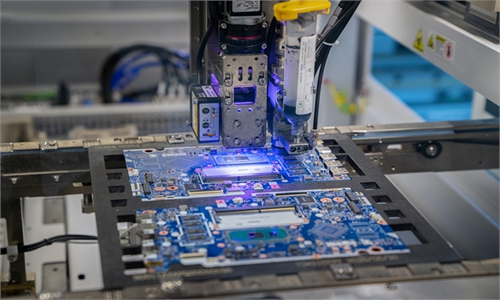
Photo: VCG
Amid reports that the US is considering blacklisting a number of Chinese semiconductor firms linked to tech giant Huawei Technologies, a Chinese industry expert said on Wednesday that the US will not be able to contain the rise of the Chinese chip industry and its crackdown efforts will backfire on the US itself.
The US has been trying to cut China off from the global chip supply chain by adopting various measures such as restricting US chip exports to China, pressuring its allies to join this effort and weighing sanctions on China's tech firms, Ma Jihua, a veteran telecom observer, told the Global Times on Wednesday.
"Although it has indulged in 'small yard and high fence' tactics, the US' efforts to suppress China's semiconductor industry and other high-tech sectors to contain the country's high-quality development has not been successful, and it will be difficult to achieve in the future," Ma noted.
On Wednesday, Bloomberg cited sources who said the administration of President Joe Biden is considering "blacklisting a number of Chinese semiconductor firms linked to Huawei Technologies Co after the telecom giant notched a significant technological breakthrough last year." The companies that could be blacklisted include chipmakers Qingdao Si'En, SwaySure, and Shenzhen Pensun Technology Co, it said.
Huawei's chip developer HiSilicon is making steady progress in the field. HiSilicon's chip shipments in the fourth quarter of 2023 reached 6.8 million units, up more than 50 times year-on-year, media reports said, citing data from Canalys.
The Biden administration's efforts to curb China's high-tech industry have failed to halt the advancement of China's chip sector. Instead, they have only accelerated the drive for independent research and domestic substitution, pushing China further toward self-reliance in the area, Ma said.
While sparing no efforts to cut Huawei's access to leading global chipmakers, the US is also actively weighing another sanctions package on multiple firms. On March 9, Bloomberg reported that the US Department of Commerce's Bureau of Industry and Security is considering adding ChangXin Memory Technologies (CXMT) and five other Chinese companies to the Entity List, which would limit their access to US technology.
This move is a response to the so-called "national security concerns" that have arisen in the wake of Huawei's success in coping with the US crackdown, said the expert, noting that should this materialize, it would not impede CXMT's capacity to develop advanced semiconductors, and would actually backfire on the US itself.
US Commerce Secretary Gina Raimondo said on March 11 during a recent visit to the Philippines that the US is constantly assessing the need to expand export controls to stop China from acquiring advanced computer chips and manufacturing equipment.
Such moves won't solve the problem of the hollowing out of the US manufacturing industry, nor can they prevent the upward development of China's chip industry, said the expert.
Given the endless US measures, China should strive for self-reliance in technology innovation through enhanced international cooperation, Ma said.
The expert also urged the US government to remove its high-tech clampdown on Chinese companies, in order to avoid disrupting global industry and supply chains.
China is one of the major semiconductor markets in the world. The US efforts will not stop China's innovation-driven development, nor will it do any good for US companies or the entire semiconductor industry, Foreign Ministry spokesperson Mao Ning told a press conference on February 27.

